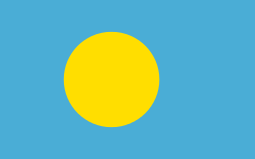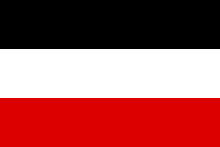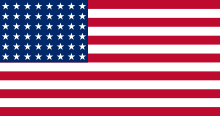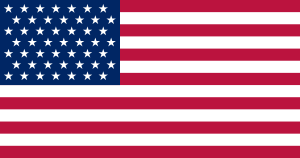Flag of Palau
 | |
| Use | Civil and state flag, civil and state ensign |
|---|---|
| Proportion | 5:8 |
| Adopted | 1 January 1981 |
| Design | A light blue field with the large yellow disk shifted slightly to the hoist-side of center. |
| Designed by | Blau J. Skebong |
The flag of Palau was adopted on 1 January 1981, when the island group separated from the United Nations Trust Territory. As with the flags of several other Pacific island groups, blue is the colour used to represent the ocean and the nation's place within it. While this puts Palau in common with the Federated States of Micronesia and other neighboring island groups, the disc on the flag (similar to that on Japan's flag) is off-centre like that of the flag of Bangladesh, but in this case represents the moon instead of the sun. The current flag was introduced in 1981 when Palau became a republic.
Previously, the flag of the Trust Territory of the Pacific Islands was flown jointly with the United Nations and American flags. The flag's very simple design belies the depth of meaning attributed to it. The explanation for the choice of colours is rooted in the history and customs of the Palauan people. The bright blue of the field, which might be assumed to be symbolic of the Pacific Ocean, is in fact a representation of the transition from foreign domination to self-government. The golden disk, which sits slightly off-centre toward the hoist, represents the full moon. The Palauans consider the full moon to be the optimum time for human activity. At this time of the month, celebrations, fishing, sowing, harvesting, tree-felling, and the carving of traditional canoes are carried out. The moon is a symbol of peace, love, and tranquility.
Futaranosuke Nagoshi (名越二荒之助), a Japanese professor who studies international relations, made mention of a probable relation between flag of Palau and that of Japan.[1] According to his idea, the motif of the moon is a kind of homage to the Rising-Sun flag and describes the symbol of amity between Palau and Japan. In a related matter, former Palauan President Kuniwo Nakamura once said with an ironical smile, "That's one way of putting it."[2]
Historical flags
-
.svg.png)
Flag of Spain, who owned Palau until 1899 as part of the Spanish East Indies
-

Flag of the German Colonial Empire, used in some of Palau from 1885, and all of Palau 1899–1914
-
.svg.png)
Flag of Japan, used in Palau 1914–1944
-

This flag of the United States was used in Palau from 1944–1959
-

This flag of the United States was used in Palau from 1959–1960
-
.svg.png)
This flag of the United States was used in Palau from 1960–1994
-

Flag of the Trust Territory of the Pacific Islands was used in ROP 1965–1981
-

The flag of the United Nations was used in Palau from 1947–1965
Similar flags
References
- ↑ Futaranosuke Nagoshi (1987) 世界に生きる日本の心(Sekai ni ikiru nihon no kokoro, Japanese spirits being around the world). Tendensha.
- ↑ Reizō Utagawa (December 1999). "Travels in Republic of Palau". The financial world (in Japanese). Zaikai Kenkyujo. Archived from the original on 3 May 2009. Retrieved 2009-05-03.